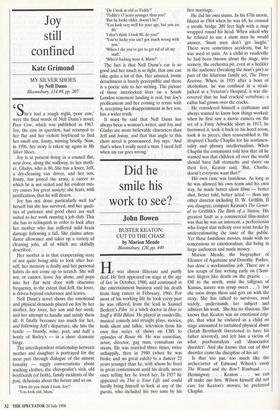Joy still
confined
Kate Grimond MY SILVER SHOES by Nell Dunn
Bloomsbury, £14.99, pp. 207
4s he's had a rough night, poor cow,' were the final words of Nell Dunn's novel, Poor Cow, which was published in 1967. Joy, the cow in question, had returned to her flat and her violent boyfriend to find her small son, Jonny, missing briefly. Now, in 1996, her story is taken up again in My Silver Shoes.
Joy is at present living in a council flat, next door, along the walkway, to her moth- er, Gladys, who is 80. She has a lover, Jeff, a dry-cleaning van driver, and her son, Jonny, has joined the army, a career to which he is not suited and his evident mis- ery causes Joy great anxiety; she fears, with justification, that he will desert.
Joy has not done particularly well foe herself but she has survived, and her quali- ties of patience and good cheer are well suited to her work running a job club. This she has to relinquish in order to look after her mother who has suffered mild brain damage following a fall. She claims atten- dance allowance and takes up a variety of cleaning jobs, all of which are skilfully described.
Her mother is in that exasperating state of not quite being able to look after her- self; her memory is faulty and her personal habits do not come up to scratch. She will not, or cannot, leave Joy alone, and pops into her flat next door with obsessive frequency, to the extent that Jeff, the lover, is driven beyond endurance and leaves.
Nell Dunn's novel shows the emotional and physical demands placed on Joy by her mother, her lover, her son and her work, and her attempt to handle and satisfy them all. It finally becomes too much for her, and following Jeff's departure, she hits the bottle — brandy, wine, port, and half a bottle of Bailey's — in a short dramatic binge.
The interdependent relationship between mother and daughter is portrayed for the most part through dialogue of the utmost banality — niggly conversations about washing clothes, the chiropodist's visit, old boyfriends (of both), family incidents of the past, delusions about the future and so on.
`How do you think I look, Joy?'
'You look old, Mum.'
`Do I look as old as Teddy?'
'Teddy's 17 years younger than you!'
`But he looks older, doesn't he?'
`You look very well for your age, but you are 80.'
`I don't think I look 80, do you?'
'You're lucky you ain't got much wrong with you.'
'When I die you've got to get rid of all my stuff.'
`Who'd fucking want it, Mum?'
The fact is that Nell Dunn's ear is so good and her touch is so light, that one can take quite a lot of this. Her amused, ironic detachment is barely perceptible and there is a poetic side to her writing. The picture of those interlocked lives on a South London tenement landing is real, but Joy's predicament and her coming to terms with it, accepting her disappointment in her son, has a wider truth.
It must be said that Nell Dunn has always been a woman's writer, and Joy and Gladys are more believable characters than Jeff and Jonny, and that that angle to this short novel is pronounced. Joy says: 'And that's when I really need a man. I need Jeff when my car goes wrong.'


























































 Previous page
Previous page